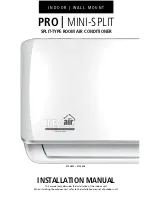
5
Fig. 5 Remote Control Unit
C
SLEEP Button
D
MASTER CONTROL Button
E
SET TEMP./SET TIME Buttons (
)
F
Signal Transmitter
G
TIMER Button
H
FAN CONTROL Button
I
START/STOP Button
J
Battery compartment lid
Inside of the battery compartment lid (Fig. 6)
K
AIR FLOW DIRECTION Button
L
ENERGY SAVE Button
M
CODE CHANGE (Slide Switch)
Switching the remote control unit code.
(Max. 4 units)
N
TIME ADJUST Button
O
TEST RUN Button
●
This button is used when installing the air
conditioner and should not be used under
normal conditions as it will cause the air
conditioner’s thermostat function to oper-
ate incorrectly.
●
If this button is pressed during normal op-
eration, the unit will switch to test opera-
tion mode, and the indoor unit’s OPERA-
TION indicator lamp and TIMER indicator
lamp will begin to flash simultaneously.
●
To stop the test operation mode, either
press the TEST RUN button once again, or
press the START/STOP button to stop the
air conditioner.
P
ACL Button
Q
Remote Control Unit Display (Fig. 7)
R
Transmit Indicator
S
Clock Display
T
Operating Mode Display
U
Timer Mode Display
V
Fan Speed Display
W
Temperature Set Display
X
Timer Set Indicator
Y
Temperature Set Indicator
Fig. 1 Indoor Unit
1
Operating Control Panel (Fig. 2)
2
MANUAL AUTO button
3
Remote Control Signal Receiver
4
OPERATION Indicator Lamp (red)
5
TIMER Indicator Lamp (green)
6
SWING Indicator Lamp (orange)
(HORIZONTAL SWING)
7
SWING Indicator Lamp (orange)
(VERTICAL SWING)
●
If the TIMER indicator lamp flashes when
the timer is operating, it indicates that a
fault has occurred with the timer setting
(See Page 17 Auto Restart).
8
Intake Grille
9
UP/DOWN Air Direction Flap
0
RIGHT/LEFT Air Direction Louvers
(behind UP/DOWN Air Direction Flap)
Fig. 4 Outdoor Unit
A
Intake Port
B
Outlet Port



































